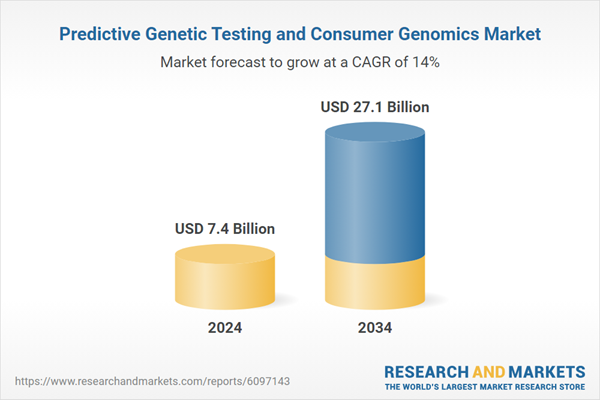Technological breakthroughs, particularly in next-generation sequencing (NGS) and AI-powered genomic interpretation, have dramatically improved test precision and lowered costs, broadening consumer access. These advancements are further complemented by partnerships between genetic testing firms and healthcare providers, facilitating the integration of genomic data into clinical care. As the prevalence of chronic illnesses rises, and healthcare increasingly adopts predictive and precision medicine, North America is positioned to remain the global leader in this evolving landscape. The expanding use of direct-to-consumer (DTC) genetic tests has significantly influenced market momentum, offering individuals immediate access to health risk insights, ancestry breakdowns, and lifestyle-related genetic traits. With a surge in demand from a tech-savvy and health-conscious population, these offerings are becoming more mainstream. Additionally, strong governmental backing through initiatives and research funding from institutions like the NIH has created a robust foundation for the development and application of genomic tools.
The predictive testing segment led the market in 2024, valued at USD 4.1 billion. These tests assess the likelihood of individuals developing specific diseases or conditions based on their genetic makeup, enabling early intervention and personalized healthcare strategies. The cancer screening application accounted for a significant market share, utilizing genetic analysis to detect mutations associated with various cancers, facilitating early diagnosis and targeted prevention measures.
The DTC segment led the global predictive genetic testing and consumer genomics market in 2024, generating USD 4.3 billion and is projected to reach USD 14.5 billion by 2034, driven by offering consumers convenient access to genetic insights without the involvement of healthcare professionals. The growing demand for personalized health and wellness solutions is fueling the adoption of DTC testing services. These tests empower individuals to explore their ancestry, lifestyle traits, and potential health risks from the comfort of their homes. With user-friendly platforms and cost-effective kits, DTC companies are driving mainstream consumer engagement across both developed and emerging markets.
North America Predictive Genetic Testing and Consumer Genomics Market held 42% share in 2024 driven by a sophisticated healthcare infrastructure, early adoption of genetic technologies, and a strong cultural shift toward personalized and preventative medicine. Consumers in the region are increasingly embracing genomic testing as part of routine health and wellness practices, spurred by growing awareness, higher education levels, and digital health engagement.
Key players in the Global Predictive Genetic Testing and Consumer Genomics Industry include Abbott Laboratories, Agilent Technologies, ARUP Laboratories, BGI Genomics, Bio-Rad Laboratories, Danaher, EasyDNA, F. Hoffmann-La Roche, Illumina, Myriad Genetics, QIAGEN, Quest Diagnostics, Thermo Fisher Scientific, and Variantyx. Companies in the predictive genetic testing and consumer genomics market employ various strategies to strengthen their market presence. These include investing in research and development to enhance test accuracy and expand service offerings, forming strategic partnerships with healthcare providers to integrate genetic testing into clinical practices, and expanding direct-to-consumer services to increase accessibility. Additionally, companies are focusing on regulatory compliance to gain consumer trust and ensure the reliability of their tests.
Comprehensive Market Analysis and Forecast
- Industry trends, key growth drivers, challenges, future opportunities, and regulatory landscape
- Competitive landscape with Porter’s Five Forces and PESTEL analysis
- Market size, segmentation, and regional forecasts
- In-depth company profiles, business strategies, financial insights, and SWOT analysis
This product will be delivered within 2-4 business days.
Table of Contents
Companies Mentioned
The companies featured in this Predictive Genetic Testing and Consumer Genomics market report include:- Abbott Laboratories
- Agilent Technologies
- ARUP Laboratories
- BGI Genomics
- Bio-Rad Laboratories
- Danaher
- EasyDNA
- F. Hoffmann-La Roche
- Illumina
- Myriad Genetics
- QIAGEN
- Quest Diagnostics
- Thermo Fisher Scientific
- Variantyx
Table Information
| Report Attribute | Details |
|---|---|
| No. of Pages | 135 |
| Published | May 2025 |
| Forecast Period | 2024 - 2034 |
| Estimated Market Value ( USD | $ 7.4 Billion |
| Forecasted Market Value ( USD | $ 27.1 Billion |
| Compound Annual Growth Rate | 14.0% |
| Regions Covered | Global |
| No. of Companies Mentioned | 14 |









